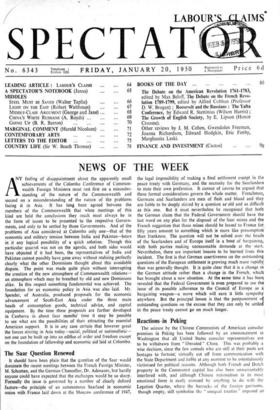The Saar Question Renewed
It should have been plain that the question of the Saar would dominate the recent meetings between the French Foreign Minister, M. Schuman, and the German Chancellor, Dr. Adenauer, but hardly anyone could have expected that the exchanges would be so sharp. Formally the issue is governed by a number of clearly defined factors—the principle -13f an autonomous Saarland in economic union with France laid down at the Moscow conference of 1947, the legal impossibility of making a final settlement except in the peace treaty with Germany, and the necessity for the Saarlanders to state their own preference. It cannot of course be argued that these formal considerations govern the whole matter. Frenchmen, Germans and Saarlanders are men of flesh and blood and they are liable to be deeply stirred by a question as' old and as difficult as this one. But it must nevertheless be recognised that both the German claim that the Federal Government should have the last word on any plan for the disposal of the Saar mines and the French suggestion that those mines should be leased to France for.1 fifty years amount to something which is more like presumption' than frankness. The question will not be solved over the heads of the Saarlanders and of Europe itself in a bout of bargaining, with both parties making unreasonable demands at the start. Nevertheless, there are important lessons to be learned from this incident. The first is that German assertiveness on the outstanding questions of the European settlement is growing much more rapidlYi than was generally thought. It is quite clear that it is a change in the German attitude rather than a change in the French, which' has brought about a new situation. At the same time it has Beet revealed that the Federal Government is even prepared to use the issue of its possible adherence to the Council of Europe as i bargaining weapon—a move which will earn it little sympathy anywhere. But the principal lesson is that the postponement o outstanding questions on the excuse that they can only be settled in the peace treaty cannot go on much longer.


































